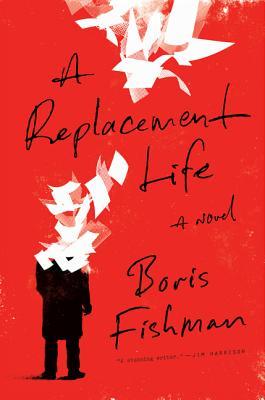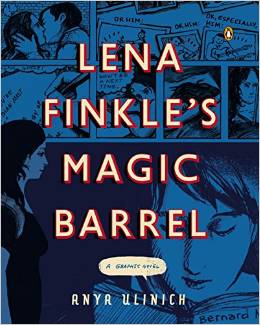 Featuring: A Replacement Life by Boris Fishman (NY: Harper, 2014)* and Lena Finkle’s Magic Barrel – A Graphic Novel by Anya Ulinich (NY: Penguin, 2014).
Featuring: A Replacement Life by Boris Fishman (NY: Harper, 2014)* and Lena Finkle’s Magic Barrel – A Graphic Novel by Anya Ulinich (NY: Penguin, 2014).
If you want to read an authoritative high-brow book review on either of these books, hop to the New York Times Book Review where both books are highly touted. If you want to read a Midwesterner's account of how I connect to these books and how it relates to our book, Jewish Luck, keep reading.
These novels have something in common besides being extremely funny, well written, and, no doubt, somewhat autobiographical. Both are written by Soviet émigrés who came to the US at a young age. Boris Fishman arrived in New York City at age 9 from Minsk; however, his neighborhood in Brooklyn might better be named New Minsk. Anya Ulinich immigrated from Moscow to Arizona at age 17.
What better topic for these Americanized emigrés to write about than family, themselves, and the community of Soviet Jews. Both protagonists are writers and neither has found true love. They both waver between the connection with the old and new.
Boris Fisher's protagonist, Slava (meaning Glory) is a schmendrick (a nincompoop) attempting to be a mensch (a good person). He’s a not very successful professional writer who is composing fake histories for the Soviet Jews from his old neighborhood so that they can receive reparations from the German government. His grandmother would have been entitled to this money but she has just died, so his grandfather thinks it is reasonable that Slava adapt her history of being in a concentration camp with himself as the internee. And what about his grandfather’s friends? All the Soviet Jews are survivors even if they weren’t put into a German concentration camp. Meanwhile, his grandfather is secretly collecting money for each history Slava writes. Slava spends a lot of time equivocating and rationalizing when he's not lying.
But one also understands that Slava is coming to grips with his own history as well and his debt to his ancestors. In the beginning, the author explains Slava’s alienation from his family. “But if Slava wished to become an American, to strip from his writing the pollution that refilled it every time he returned to the swamp broth of Soviet Brooklyn…he would have to get away.” (page 11).
The death of his grandmother, who had been his strongest attachment, returns him to family.
“Mother had taken from Grandmother the condiments without the meal. She clung to Slava but knew not why and did not ask. Grandmother clung because her previous family had been taken without asking. This one she would hold to faster than iron---with this one, she would make sure to die first, in the natural order.” (p.19)
Boris Fishman writes beautifully with eloquent descriptions and long chapters. This makes it a difficult book to read at night for 15 minutes before bed. The most beautiful section is towards the end when he speaks about how we are the replacements for the next generation and how each of us is looked after by three generations who have passed before us.
 Anya Ulinich is a stitch. I purchased the book before knowing it was a graphic novel, and although I didn't think I was capable of reading graphic novels, I found it hilarious and rewarding. You can read a few pages at a time and enjoy the heck out of it. It is naughty the way the TV show "Girls" is naughty. I loved all the characters - the overly competent Mom, the questionable best friend, the Russian boyfriend who still waits for her after umpteen years, and especially her little Lena (her conscience) who appears frequently. This reminds me of our Vera’s Isya, the little Jewish man who tells her what to do. Lena Finkle’s inner voice as a cartoon character is a great device. It is interesting that there is not a female word for shmendrick – but Lena is far from a balabusta (which means something much nicer than it sounds – a good homemaker, the supreme Yiddish compliment for a female. Oy vey.) She is a single mother of two who is desperately trying to find an appropriate man or any man for that matter.
Anya Ulinich is a stitch. I purchased the book before knowing it was a graphic novel, and although I didn't think I was capable of reading graphic novels, I found it hilarious and rewarding. You can read a few pages at a time and enjoy the heck out of it. It is naughty the way the TV show "Girls" is naughty. I loved all the characters - the overly competent Mom, the questionable best friend, the Russian boyfriend who still waits for her after umpteen years, and especially her little Lena (her conscience) who appears frequently. This reminds me of our Vera’s Isya, the little Jewish man who tells her what to do. Lena Finkle’s inner voice as a cartoon character is a great device. It is interesting that there is not a female word for shmendrick – but Lena is far from a balabusta (which means something much nicer than it sounds – a good homemaker, the supreme Yiddish compliment for a female. Oy vey.) She is a single mother of two who is desperately trying to find an appropriate man or any man for that matter.
The character, Lena Finkel, describes her arrival in Phoenix in 1991 with its perks and burdens of being taken in by the Jewish community. She mentions synagogue as the “boringest part of my education.” (p. 74)
“In Moscow you didn’t have to try so hard to be a Jew. It was like gender. You were born with it. You looked a little different. Your name was sorta weird…maybe you played piano a little…or chess…it was likely your parents never had vodka for breakfast…and sometimes being a Jew got dangerous and kinda punk”. (p. 74-75)
Both of these books are by literary talents who use their deep knowledge of the English language to illuminate the overlapping worlds of here and there, the US and the Soviet Union. These writers are from a generation in transition.
I believe that their parents’ experience is what our character, Vera, was trying to avoid for herself – the awkwardness of losing yourself, your status, your history by becoming an émigré in America and not quite fitting in, knowing it is the next generation who will have that privilege. For Alisa, Sweden has been a stopover, where her husband, Rolf, and daughter belong, but she seems to be searching for a more permanent home. For both, the journey is not yet over.
Notes on this review:
- Meryll doesn’t approve of the term schmendrick and believes that schlemiel would have been preferable. She thinks Leo Rosten, who wrote The Joys of Yiddish, would agree. I was too lazy to get ahold of that book, but I am satisfied with my Google search. I did get my hands on The Education of Hyman Kaplan (1937) by Rosten, which may be my next book review.
- My mother thinks balabusta refers not simply to a good homemaker, but to a woman who can make anything happen. Everyone has an opinion. Feel free to offer yours.
- Leslie said to feel free, so here's my (Meryll's) contribution. I just finished A Replacement Life and I don't think schmendrick quite fits Slava. I see him as a wannabe intellectual who is looking for his place in American life. I tired of reading about him by about the middle of the book but I soldiered on. What I did like about Slava was that whether or not the older Russians received reparations from Slava's literary efforts, he took the time to care for them and to listen to them. I did like thinking about the title and what it meant to the characters in the book.
* A Replacement Life was a finalist for the National Jewish Book Award 2015 in the Fiction category and we recommended it ahead of the award. Congratulations to Boris Fishman.